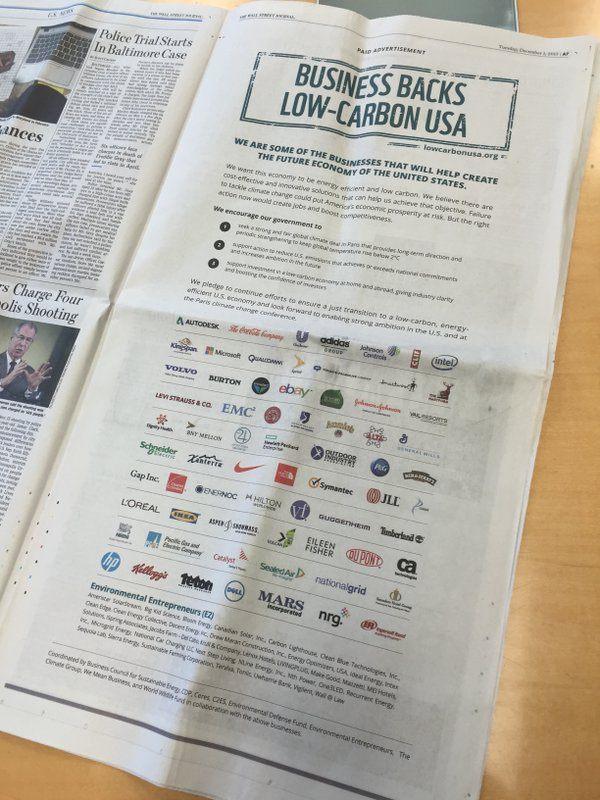
Editor's note: This post originally appeared on the EDF+Business blog.
By Victoria Mills
The chorus of business voices calling for climate action has grown steadily in size and strength in the months leading up to the Paris climate talks. Now that COP21 is finally here, companies have pumped up the volume even more, with a full-page ad in the Wall Street Journal (pictured right) and a wave of new commitments to the American Business Act on Climate Pledge.
Championing a low-carbon USA
In the Wall Street Journal on Dec. 1, over a hundred U.S. companies placed a full-page advertisement calling for a shift to a low-carbon economy. The ad’s message is simple: Failure to act on climate change puts America’s prosperity at risk, but the right action now will create jobs and boost competitiveness.
Companies as diverse as Colgate-Palmolive, DuPont, eBay, General Mills, Ingersoll-Rand, Microsoft, Owens Corning and Pacific Gas & Electric signed on to the ad, which encourages the U.S. government to:
- Seek a strong and fair global climate deal in Paris that provides long-term direction and periodic strengthening to keep global temperature rise below 2 degrees Celsius.
- Support action to reduce U.S. emissions that achieves or exceeds national commitments and increases ambition in the future.
- Support investment in a low-carbon economy at home and abroad, giving industry clarity and boosting the confidence of investors.
These companies recognize that their efforts alone can’t solve an issue like climate change. Businesses need governments around the world to act as well. By setting ambitious goals and providing regulatory certainty, governments can unleash the power of the marketplace to deliver the necessary reductions in emissions, while also boosting competitiveness and economic growth.
Walking the talk with the White House
This week, the White House announced that another 73 companies – including Amazon, Cisco Systems, Genentech, News Corp., Rio Tinto and United Technologies – have signed on to the American Business Act on Climate Pledge.
By signing the pledge, businesses not only declare their support for a strong outcome in Paris, but also commit to cut greenhouse gas emissions in their own operations. With this third wave of pledges, 154 companies are saying that a low-carbon economy is good for business. These companies have operations in all 50 states, employ nearly 11 million people, represent more than $4.2 trillion in annual revenue and have a combined market capitalization of over $7 trillion.
Aiming high for best results
One final point about goal-setting: Ambitious goals drive superior results. Just ask Walmart. The retailer recently surpassed its goal of reducing its global greenhouse gas emissions by 20 million metric tons by 2015, reducing them instead by 28 million metric tons. The company achieved these reductions through a wide range of initiatives, from improving energy efficiency to greening its fleet to working with EDF to cut fertilizer use across 20 million acres of farmland.
If you had asked Walmart 10 years ago how it was going to deliver the 20 million metric tons, it’s unlikely the company could have told you. But having an ambitious goal sealed its commitment and unleashed the creativity needed to get it done – and then some.
And that's exactly the message our negotiators in Paris need to hear: Set the targets needed to stabilize the climate, and let business innovate to meet them. Whatever the outcome of COP 21, the leadership these companies have demonstrated through their public commitments to address climate change will be even more important after the delegates come home and it’s time to turn talk into action. We look forward to seeing that leadership continue in the months and years ahead.
Image courtesy of the author.
Victoria Mills is Managing Director of Corporate Partnerships at Environmental Defense Fund (EDF).
TriplePundit has published articles from over 1000 contributors. If you'd like to be a guest author, please get in touch!














